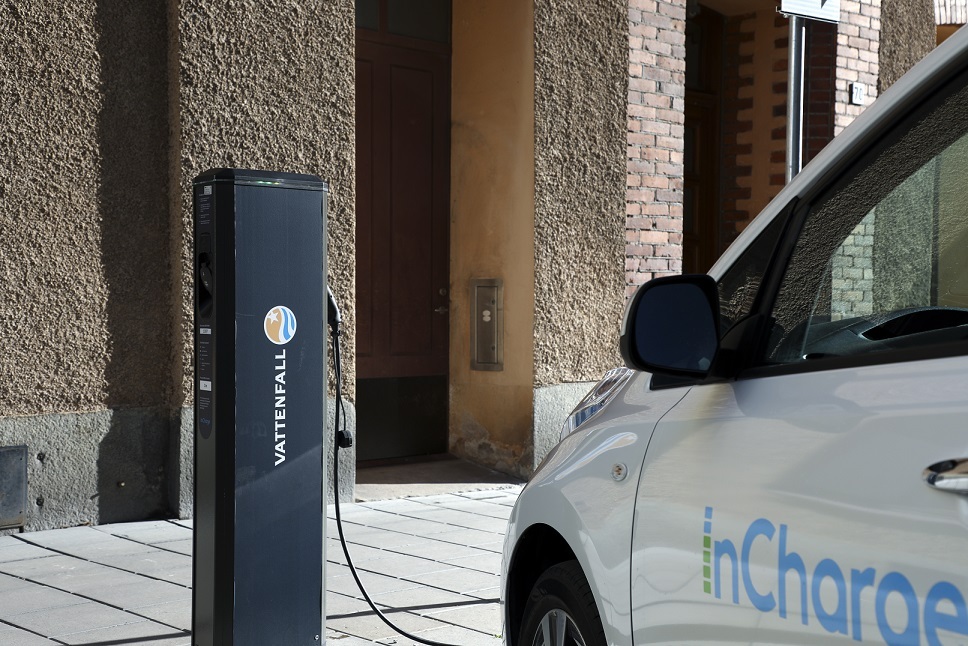Vattenfall is to make a play for dominance in the UK’s electric vehicle charging market with the launch of its open access InCharge concept next month.
The Swedish-state utility will bring over ten years of experience in developing a network of EV chargers across the Netherlands, Germany and Sweden to bare in the UK and take advantage of the opportunities emerging in the fledgling market.
It will seek to begin deployment within the commercial sector, targeting partnerships with businesses in need of e-mobility capabilities such as commercial developers, real-estate companies, fleet owners and public bodies.
Vattenfall hopes to have its first charge points installed during the second half of the year and has already signed up Alfen ICU as a delivery partner in the UK. Taking a “technology agnostic approach”, the company will seek to build a ‘multi-hardware compatible’ network utilising a variety of technology providers.
It will then move onto the residential charging market to complete its provision of chargers across homes, workplaces and in public.
As well as working with leasing firms and car manufacturers in addition to chasing direct sales through digital channels, Vattenfall will link its InCharge offer to its UK retail energy business iSupplyEnergy, which it purchased in June 2017.
At the time of acquisition, the UK supplier served more than 120,000 gas and electricity customers, who could now be offered home EV charging tariffs as part of their contracts.
A strong offer to make
Tomas Björnsson, Vattenfall’s head of e-mobility, said: “We have big ambitions for rolling out InCharge in the GB. Its early days for our market entry but we know from our success in growing the EV market in Germany, the Netherlands and Sweden – and recent rapid growth in low carbon transport in GB – that we have a strong offer to make to the GB driver.
“We have worked closely with many partners in other countries and we know we can make this a success in the GB.”
While the number of EVs in the UK stands at around 150,000 within a national fleet of almost 38 million, growth has been substantial year on year and as Björnsson explained this morning, Vattenfall is looking to take advantage of this growing trend.
“What we are seeing now is the market really taking off, not just on a national basis but really turning into a big large scale international business. This is a game where we can offer something significant, we can stand out and we want to be one of the top players,” he said.
“We are here to be relevant and significant, we are aiming at a leading top three position over time so definitely growing significantly faster than the market at this stage.
Providing access for all
Vattenfall believes it will be able to set itself apart via its ‘any-driver-can-use’ infrastructure concept, which is intended to allow any EV to charge at any Vattenfall InCharge charging point on a pay-as-you-go basis.
In it’s over 9,000 strong European charging network, charge cards or tags are used as currently they offer the most cost effective method for paying. However, Vattenfall told Current± that the growing use of digitalisation in the development of payment methods to make transactions easier, such as contactless card payments already used by some network operators, is “a really interesting area of development in the sector”
Vattenfall will also promote roaming agreements with other charge point operators or driver service providers to allow use of their infrastructure and will seek to promote this within local tenders, with Björnsson stating that a more open network is a ‘must’ if the country’s EV potential is to be realised.
“We are now in the UK to make ownership of charging infrastructure and the driving of EVs completely hassle-free, that is our big aspiration,” he said.
EVs ‘prioritised and highlighted in UK policy’
While the company has operated in the UK for over ten years developing wind farms and its newly completed 22MW battery delivering Enhanced Frequency Response – investing £3 billion in the UK over this period – Vattenfall’s entry into the EV space will come as good news for the UK government and its recent efforts to promote the technology.
Björnsson explained: “When it comes to the policy landscape, I think this is of course one part of why we are now entering the UK. There are a lot of very good things being done, there is a strong push and a clear direction set on the 2040 [ban] on the sale of traditional diesel or gasoline cars. There [are] incentives to invest in infrastructure.
“This is something that is now prioritised and highlighted in UK policy, we’re very positive about the Clean Growth Strategy, the Automated and Electric Vehicles Bill – all of this is really pointing towards a massive push.”
Magnus Hall, Vattenfall’s president and CEO, added: “We are in Britain to grow, and the GB’s electric vehicle ambitions are a perfect fit with our smart, digitalised and low carbon electric vehicle strategy.”
The company will launch its InCharge product in June and is currently building an e-mobility team to serve the UK, with country director Anthony Hind joining in the coming weeks.






